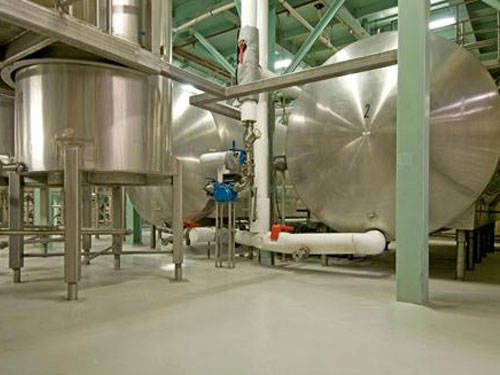
Choosing the right flooring for food and beverage industry
Safety and hygiene are always top priorities in any industry, especially in the food manufacturing and processing industry, when there are always requirements associated with the facility. materials in food production and processing units. Food safety is a vital element of a food business. Therefore, it is necessary to invest in choosing to build a hygienic system of facilities from the planning stage to avoid future losses for the unit. There are many factors that need to be taken into account when building a food business facility, but one of the most important is the floor of the establishment. Not all flooring types meet hygiene standards. food safety and regulations on food and beverage production. Incorrectly choosing the right type of floor for the production facility can affect the censorship process, require renovation and repair, etc., affecting the production activities of enterprises. Not only that, the floor of the food production facility must be exposed to a lot of products such as fat, grease, blood, sugar and food acids, which accumulate and cause significant damage to the floor. , especially noticeable on concrete floors, when the floor is corroded, cracked, broken, thereby affecting the quality of food safety and hygiene of the business. Then there are industry-specific cleaning processes that can have a dramatic impact on existing concrete floors. For the above reasons, it is necessary to choose a floor in accordance with the standards and operating procedures of the food manufacturing and processing enterprises. One of the more popular options is epoxy flooring for food processing and manufacturing facilities. And the following are the reasons why you should prioritize using epoxy flooring for food businesses.Typical food& beverage flooring requirements
Hygiene
Any production facility needs to ensure the hygiene of the floor, especially this is even more important in food and beverage production facilities. Not only that, the floor of the food and beverage production facility must also meet the criteria of food hygiene and safety such as FDA, HACCP… these criteria require the floor to be kept clean. after use. To meet these criteria, a seamless floor system is preferred when there are no joints and joints to prevent bacteria from multiplying, then floors that are resistant to commonly used cleaning chemicals. used in production facilities to avoid the phenomenon of peeling and damage to the floor… Epoxy floors fully meet those criteria. If using a floor with grout with grout, it will easily become a place for mold bacteria, thereby affecting the hygiene standard of the floor. Or using concrete floors, cleaning chemicals affect the concrete floor, thereby causing cracking and breaking of the concrete floor, affecting the aesthetics as well as ensuring safety standards for the facility.Sustainability
More and more businesses prioritize the use of environmentally friendly materials, and the environmental control regulations of host countries are also increasingly demanding. When using Stonehard’s epoxy/PU floor system, it will help reduce carbon emissions in the air, thereby helping businesses ensure their commitments to the environment, and meet state regulations on the environment. .Slip resistant
With the food industry, it is imperative to ensure that the floor meets all safety standards for workers. Therefore, the floor surface of food processing establishments should have a certain level of anti-slip, in order to avoid slipping and causing injury during work. In addition, in wet production conditions, the floor should have an inclined design so that the drainage takes place faster, avoiding slipping during the working process.Chemical resistant
The floor of a food processing facility requires special attention to the chemical resistance of the floor. Shown in being able to resist chemicals that are spilled on the floor during production, including acids available in food and cleaning chemicals. Therefore, before proceeding to build floors for production facilities, it is advisable to consider proposing chemicals that can directly affect the floor to be able to predict in advance. It is necessary to consult experts in the field of industrial factory construction to find the right product for the needs of the business.Thermal shock & cycling
Some food processing industries, face heat shock conditions quite a lot, which can lead to damage to the floor if the materials used are not suitable. Heat shock often occurs when cleaning with hot water or steam to remove stubborn waste such as blood, grease, and some other chemicals. Sudden changes in temperature can cause the floor to expand or contract over time. If the floor structure is not suitable, it can lead to phenomena such as cracking, peeling, bubbles, or delamination. Especially for areas such as cold storage, where temperature changes occur frequently, it is even more important to pay attention to this issue.INFLOOR provide high quality flooring solutions for food&beverage facilities
With many years of experience in the field of floor construction, INFLOOR provides high quality flooring solutions suitable for many areas from food factories, restaurants, kitchens. We offer Stonhard’s ultimate flooring solutions tailored to each type of business to meet the most demanding requirements. Flooring solutions from Stonhard help ensure the safety of the workforce, help businesses maintain and ensure business conditions. Contact INFLOOR for more advice on flooring products suitable for your business.Residential Location:
2/14 Vo Truong Toan St, An Phu W, Dist.2, Hcm, VN.
Pham Van Tu - Managing Director

Post A Comment